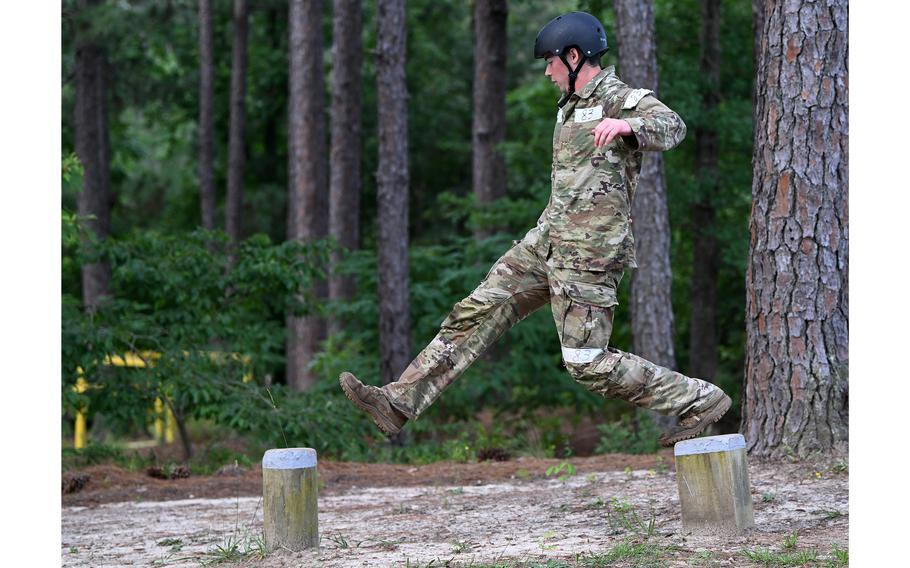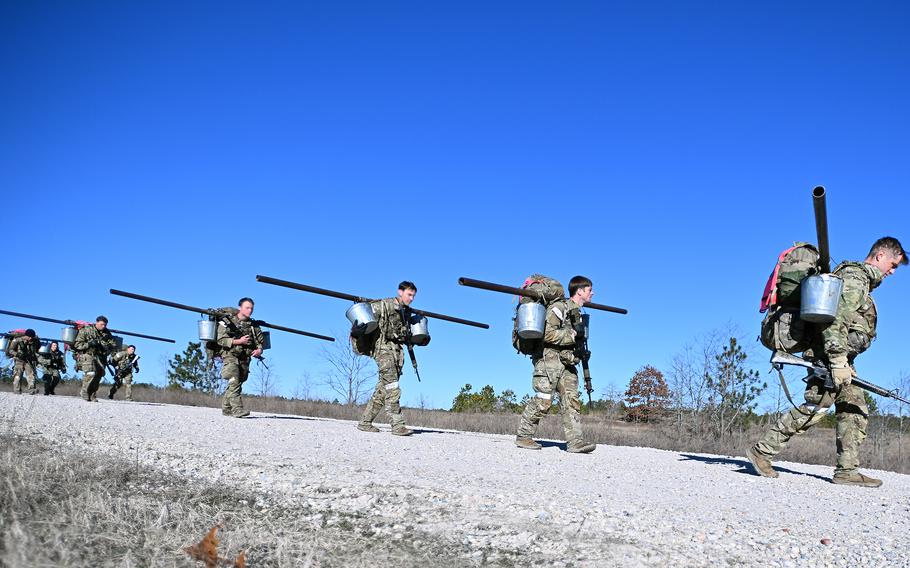
An Army Special Forces candidate negotiates an obstacle at Camp Mackall, N.C., in May 2024. Army researchers studying Special Forces trainees found that those who scored highly on a self-evaluation to assess resilience were more likely to have a rare gene variation that controls the brain’s ability to regulate serotonin, according to a study. (K. Kassens/U.S. Army)
A breakthrough gene study by Army researchers could lead to better stress management and faster recovery from psychological trauma for Special Forces soldiers.
The findings stem from analysis done by the Army’s Research Institute of Environmental Medicine during the training of candidates for the elite units.
Test subjects who scored highly on a self-evaluation to assess resilience were statistically more likely to have a rare gene variation that controls the brain’s ability to regulate serotonin, according to the study.
The results could be used in future research aimed at helping the service predict the career success of those who join Special Forces, the Army’s Medical Research and Development Command said in a statement Monday.
In addition, the discovery holds promise for helping those soldiers handle the toll on their mental health, the statement said.
Serotonin carries messages between nerve cells in the brain and throughout the body. Scientists have linked low serotonin levels to depression, anxiety, mania and other health conditions, according to the Cleveland Clinic website.
The findings were published this spring in the international journal Anxiety, Stress and Coping and were highlighted in the Army statement Monday and in a statement Tuesday from military health insurer Tricare.
Researchers in 2013 began following 73 Special Forces candidates as they progressed through three weeks of a Survival, Evasion, Resistance and Escape course, a grueling program that’s required training for special operators.
The 56 enlisted and 17 officer volunteers, all of them men, were enrolled in three separate classes at the survival school at Camp Mackall, N.C. They ranged in age from 22 to 44, with an average age of 26.8, according to the report on the study.

Army Special Forces candidates carry buckets of sand down a firebreak during testing at Camp Mackall, N.C., in January 2024. Special Forces trainees who scored highly on a self-evaluation to assess resilience were statistically more likely to have a rare gene variation that controls the brain’s ability to regulate serotonin, Army researchers found. (K. Kassens/U.S. Army)
The “school is really an optimal place to study the effects of acute stress,” Harris Lieberman, the study’s principal investigator, said in the Army statement. “In the final phase of the training, students are held in a mock prisoner-of-war camp, in which they are exposed to, and must try to resist, the stressors of captivity.”
Saliva samples to measure cortisol, a hormone that rises in response to stress, were taken at the beginning and at the end of the training, during the captivity phase.
Researchers also collected blood samples from each of the volunteers to look for genes that are commonly associated with the body’s response to stress, according to the Army statement.
Volunteers’ cortisol levels were on average nearly 10 times higher than baseline levels, Lieberman said. But despite showing evidence of physical stress, a number of them had more positive responses at the end of the course to questions such as “I am able to adapt when changes occur” and “I am not easily discouraged by failure,” the statement said.
The genomic data for those survey respondents correlated strongly with the presence of a somewhat rare variant of the gene that regulates serotonin in the brain called SNP rs4251417.
Lieberman said that 15% of volunteers who carried the variant had a statistically significant greater positive change in their resilience scores, suggesting an association between the gene and resilience in people exposed to high stress.
The frequency of the variant in the general population is only 9%, researchers noted.
The study is part of ongoing research by the institute’s military nutrition division, which has been collecting data on Special Forces trainees for more than a decade, the Army statement said.
Results are considered preliminary but align with several other studies, suggesting “some interesting possibilities for future research in support of” Special Forces, Lieberman said.